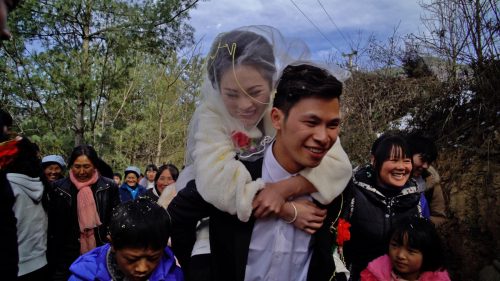
For over twenty years, Wang Bing has been one of the world’s most appreciated documentary filmmakers, with the likes of (Frederick Wiseman, Errol Morris, Joshua Oppenheimer, Agnes Varda, etc…) His work focuses on several aspects of the history of the Chinese People’s Republic. Whether the subject is recession in a given industrial district (Tie Xi Qu: West of the Tracks), the Maoist re-education camps in the 1950s (Dead Souls), life in a remote Yunnan village (Three Sisters), or the performance of orchestra conductor Wang Xilin, who stepped naked onto the stage of a Paris theatre to memorialize the imprisonment and torture endured during the Cultural Revolution (Man in Black), the ordinary work routine of oil field workers in the Gobi Desert (Crude Oil), the last ten days in Alzheimer patient Fang Xiuying’s life (Mrs. Fang), life between enslavement and teenage heartthrob in one of the hellish textile factories in the city of Zhili (the three chapters in the Youth saga, the last of which, Homecoming, will be screened at the Venice Film Festival) – Wang Bing’s radicalness does not lie in his willingness to depict the gross inequalities between the fragile livery of communist ideology and an industrial apparatus that is clearly based on the intensive exploitation of workers and an utter absence of legal protection. Wang Bing’s essential feature is, rather, in the way he makes cinema. He films workers and witnesses drawing the least possible attention, blending in the crowd, collecting hundreds of hours of footage that he then proceeds to edit with meticulous rigour.
While Wiseman shows us the secret rooms of complex systems like museums, libraries, prisons – places where every word carries a lot of weight – Wang Bing immerses his audience into a stream of light, weightless words, until the moment when a core of reflection and critique eventually appears. This is the reason why his documentaries last eight, nine, fourteen hours: truth shows up like lightning from a layer of unassuming shallowness. The disturbing, violent quality of this truth is unbelievable.

This is the third and final chapter of an investigation by the Chinese documentarian, who presented the previous installments at Cannes last year and at Locarno in August. The focus is on textile workers in China who move from their rural villages to work in urban factories. T...
A nine-hour documentary set in factories on the verge of being shut down and a masterpiece of editing, cut down from over 300 hours of footage. What will shock you is the director’s unshakable determination to show industrial recession using the simple voices and conversations of local workers. Wang Bing’s immersive, molecular filmmaking is a kind of crisis cinema that sits opposite Michael Moore’s – all fiction and special effects.
Another extraordinary witness film that grows into a piece of oral history using personal memories of a woman who had been persecuted by the Maoist regime for thirty years.
Wang Bing’s only fiction film is about a re-education camp where a million political dissidents have been interned.
An eight-hour documentary that shows testimonies from the communist regime’s Gobi Desert re-education camp survivors. Here, as in all of Wang Bing’s films, testimony and memory mean more than any specific data, they are the affirmational constitution of a community.
The first chapter of a three-part saga on the lives of young workers that every year leave the countryside and move to the city of Zhili to work on textile factories. The second part, Hard Times, has already been released. At the 2024 Venice Film Festival, we will see the third and last chapter, Homecoming.